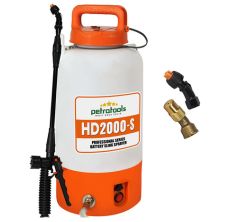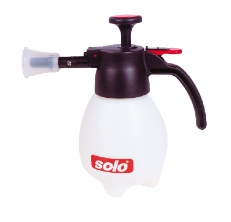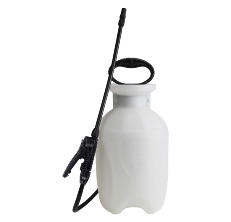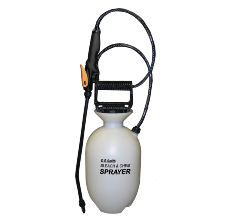The best chemical sprayer we found came from Petra, offering unparalleled performance and durability for all your lawn care needs. Equipped with the right tools, you can elevate your gardening experience. Each sprayer selected in our article is guaranteed to keep your garden looking vibrant and fresh.
From battling pesky weeds to tackling fertilizing headaches or gearing up for mosquito season, there's no denying the need for a trusty chemical sprayer. But it's not just about convenience; it's about taking control of your property's upkeep for the long haul. That's where we come in with our curated buying guide. With minimal chemical contact and maximum efficiency, these chemical sprayers make lawn care a breeze while ensuring your safety and peace of mind.
Our Top Picks For Chemical Sprayers
The Best Chemical Sprayers: A Buying Guide
What to Look for When Evaluating Chemical Sprayers
Flow rate is seriously important. It’s going to dictate how effectively you use your chemical sprayer, but you don’t want a massive flow rate, either. You already know that chemicals can be extremely expensive, so you want a 0.4 or 0.5 flow rate to help you disperse it evenly across wherever it is you’re spraying, but anything over that, and you could be wasting product without even knowing it.
In accordance with that, you’ll also want to pay attention to the reach. Nobody wants chemical blowback to hit them in the face because of a minor wind. Certain units, like the Smith, can reach up to twenty feet away from the user, giving you more distance between harmful chemicals. This is especially useful if you have a diverse landscape or need to spray behind sheds or other hard-to-reach areas.
Our top pick is great, but the only thing it doesn’t have is a long-handled spray nozzle. The long handle not only allows you to make good use of the spray length but also helps you retain better control and grip. One hand on the reservoir, one hand on the spray nozzle, and you’ll feel like a professional pest control technician. Longer nozzles also tend to have accompanying components that maintain better pressure regulation, so you’ll spend less time pressurizing your tank and more time actually spraying.
Last but not least, look towards the reservoir capacity. If you have a large yard, something over an acre or so, you’re not exactly going to have a fun time with the simple one-liter capacity of our top pick, the Solo. Instead, you might opt for something with a one-gallon tank to help you keep more chemicals on hand and spend less time refilling and pressurizing your tank. Capacity matters, and if you have a large area to cover, a backpack sprayer might be more convenient.
What to Know About Chemical Sprayers
The excellent thing about chemical sprayers is that they’re relatively cheap, regardless of what brand you go with. Even when you go for a longer hose, extended nozzle, or higher volume tank, they’re all within a fairly close price range. The main thing to look out for during shopping is brand accountability and recognition. If they’re not recognizing problems with their products, they aren’t worth your time.
Mistakes happen, both in manufacturing and during personal use. Having a rock-solid warranty from a brand you trust is key when shopping. Every chemical sprayer runs into similar problems: clogged lines, pressurization loss over time, and things of that nature. Choosing a well-known brand’s product in this regard can minimize the issues.
When dealing with potentially hazardous chemicals, it’s recommended to have two separate tanks for your chemical sprayers. One tank should be strictly for pesticides. The second tank should be for herbicides only. It’s very important to always keep your sprayers clean and in good working condition. Here are three simple steps to help you keep your tanks clean:
- Safely empty all the chemicals that are left in the tank.
- Weekly you should fill up the tank with soapy water and rinse.
- Spray the soapy water completely just like you would with chemicals. This will effectively clean all your sprayer parts within such as the tank, nozzle, and hose.
Our main goal is to always provide you with open, honest, unbiased reviews and insight into the chemical sprayers that you want. We are not taking any sponsorship from any manufacturers, so you can rest assured that you’re getting first-hand reviews and genuine information you need with no hidden agenda.
If you’ve already completed your own research, and you’re feeling ready to purchase a chemical sprayer, please check out all the products listed above for our top chemical sprayer picks. If you’d like to know more before deciding, read our benefits of a chemical sprayer below.
Benefits of Chemical Sprayers
You don’t have to manually put chemicals on your lawn any longer. Chemical sprayers help you evenly disperse your necessary yard chemicals so you’re not coming into direct skin-to-skin contact with these harmful substances. Do they help your lawn? Yes. Will they do anything nice for your skin? Definitely not. For safety’s sake, a sprayer is your best friend.
But it does more than that. That even distribution also lets you minimize waste. When you place chemicals on your lawn by hand, you’re using concentrated amounts, and even then there’s a need to use containers to pace things up. On the other hand, sprayers can help save you money, and compared to less efficient methods, they’ll pay for themselves within a year.
We wouldn’t recommend getting electric-operated chemical sprayers for your yard. These have become popular in recent years, but you really only need a manually pressurized sprayer to get the job done. For that reason, chemical sprayers are one of the most low-maintenance pieces of lawn gear that you’ll ever own.
Lastly, you can also reach further with your sprayer, and cut down your overall time spent on the task at hand. Regardless of the nozzle length, just about every sprayer can reach a minimum of ten feet in front of you, while most can reach between fifteen and twenty-five. You cover more ground, and with that distance, you’re also able to get into hard-to-reach spots that would otherwise elude you.
People Also Asked
Manual chemical sprayers vs. electric sprayers: which one is better?
Electric garden sprayers are a relatively new phenomenon as compared to manual chemical sprayers. However, they're definitely worth a try. Especially since they provide the ease to carry out longer spraying sessions in wider areas without breaking a sweat. They're more expensive and weigh more than your manual sprayers.
How long do chemical sprayers last?
The life of your sprayer ultimately depends upon its sturdiness, its build, and the wear and tear it goes through. Normally, even the most distinguished sprayers would only last for 1-3 years, given that you've used them with care.
Can I use my paint sprayer to disinfect/sanitize?
You can do that but we don't suggest it. The atomization produced by most paint sprayers is very ardent, making the disinfectants, sanitizers, and other chemicals less effective. It'll also cause the disinfectant to become airborne, harming the people nearby.
How often should I wash my sprayer?
While many of us get lazy about this, you should ideally wash your sprayer right after each session. However, even if you are to leave the chemical inside overnight, make sure your sprayer isn't pressurized or it may turn into a lethal hazard.




















